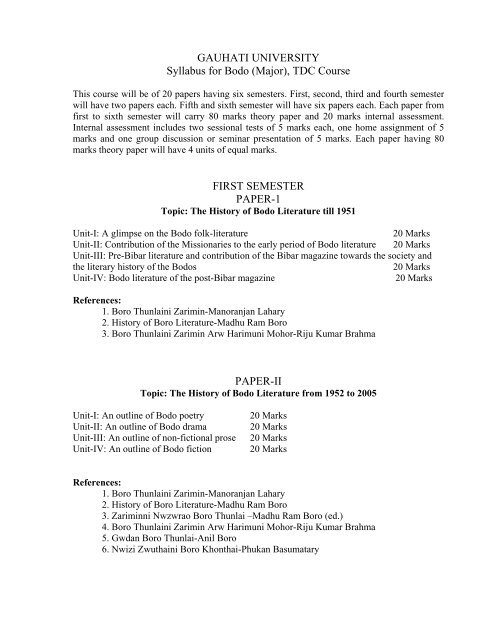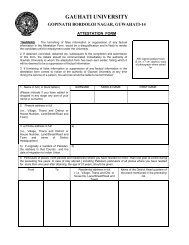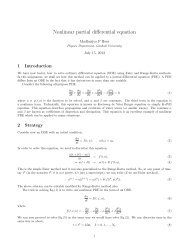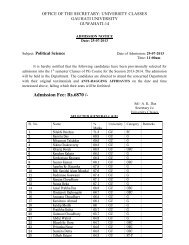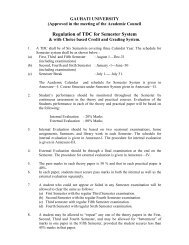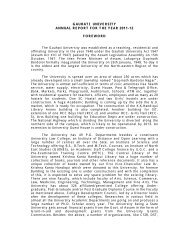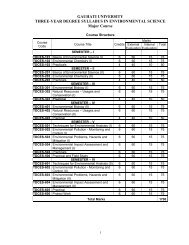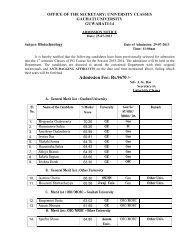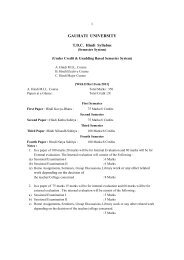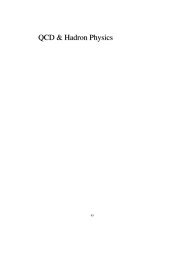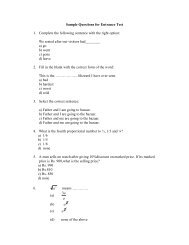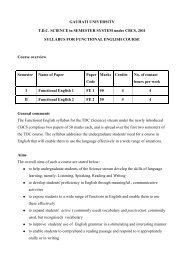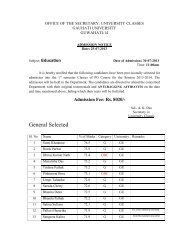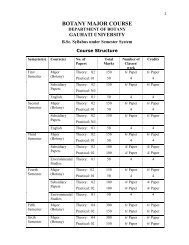GAUHATI UNIVERSITY Syllabus for Bodo (Major), TDC Course ...
GAUHATI UNIVERSITY Syllabus for Bodo (Major), TDC Course ...
GAUHATI UNIVERSITY Syllabus for Bodo (Major), TDC Course ...
Create successful ePaper yourself
Turn your PDF publications into a flip-book with our unique Google optimized e-Paper software.
<strong>GAUHATI</strong> <strong>UNIVERSITY</strong><br />
<strong>Syllabus</strong> <strong>for</strong> <strong>Bodo</strong> (<strong>Major</strong>), <strong>TDC</strong> <strong>Course</strong><br />
This course will be of 20 papers having six semesters. First, second, third and fourth semester<br />
will have two papers each. Fifth and sixth semester will have six papers each. Each paper from<br />
first to sixth semester will carry 80 marks theory paper and 20 marks internal assessment.<br />
Internal assessment includes two sessional tests of 5 marks each, one home assignment of 5<br />
marks and one group discussion or seminar presentation of 5 marks. Each paper having 80<br />
marks theory paper will have 4 units of equal marks.<br />
FIRST SEMESTER<br />
PAPER-1<br />
Topic: The History of <strong>Bodo</strong> Literature till 1951<br />
Unit-I: A glimpse on the <strong>Bodo</strong> folk-literature<br />
20 Marks<br />
Unit-II: Contribution of the Missionaries to the early period of <strong>Bodo</strong> literature 20 Marks<br />
Unit-III: Pre-Bibar literature and contribution of the Bibar magazine towards the society and<br />
the literary history of the <strong>Bodo</strong>s<br />
20 Marks<br />
Unit-IV: <strong>Bodo</strong> literature of the post-Bibar magazine<br />
20 Marks<br />
References:<br />
1. Boro Thunlaini Zarimin-Manoranjan Lahary<br />
2. History of Boro Literature-Madhu Ram Boro<br />
3. Boro Thunlaini Zarimin Arw Harimuni Mohor-Riju Kumar Brahma<br />
PAPER-II<br />
Topic: The History of <strong>Bodo</strong> Literature from 1952 to 2005<br />
Unit-I: An outline of <strong>Bodo</strong> poetry<br />
Unit-II: An outline of <strong>Bodo</strong> drama<br />
Unit-III: An outline of non-fictional prose<br />
Unit-IV: An outline of <strong>Bodo</strong> fiction<br />
20 Marks<br />
20 Marks<br />
20 Marks<br />
20 Marks<br />
References:<br />
1. Boro Thunlaini Zarimin-Manoranjan Lahary<br />
2. History of Boro Literature-Madhu Ram Boro<br />
3. Zariminni Nwzwrao Boro Thunlai –Madhu Ram Boro (ed.)<br />
4. Boro Thunlaini Zarimin Arw Harimuni Mohor-Riju Kumar Brahma<br />
5. Gwdan Boro Thunlai-Anil Boro<br />
6. Nwizi Zwuthaini Boro Khonthai-Phukan Basumatary
SECOND SEMESTER<br />
PAPER-III<br />
Topic: Western Literary Criticism<br />
Unit-I: Literary Criticism and its concept<br />
Unit-II: Poetry<br />
Unit-III: Drama<br />
Unit-IV: Novel and Short story<br />
20 Marks<br />
20 Marks<br />
20 Marks<br />
20 Marks<br />
References:<br />
1. An Introduction to the Study of Literature- W H Hudson<br />
2. Poetics- Aristotle<br />
3. A Glossary of Literary Terms-M H Abrams<br />
4. Theory of Drama-Allardyce Nicoll<br />
5. Aspects of Novel- E.M. Forster<br />
PAPER-IV<br />
Topic: Eastern Literary Criticism<br />
The topics given <strong>for</strong> each unit will have to be discussed with special reference to the <strong>Bodo</strong><br />
literature.<br />
Unit-I: Elements of Eastern Literary Criticism 20 Marks<br />
Unit-II: Rasa (Thunlaini Bidwi)<br />
20 Marks<br />
Unit-III: Alankara (Thunlaini Gohena)<br />
20 Marks<br />
Unit-IV: Chanda (Khobam)<br />
20 Marks<br />
References:<br />
1. Thunlai Arw Gohena- Manoranjan Lahary<br />
2. Sahityar Saz-Sonapati Devsarma<br />
3. Alankar Sashtra-Manoranjan Sashtri
THIRD SEMESTER<br />
PAPER-V<br />
Topic: <strong>Bodo</strong> Poetry (Up to 1951)<br />
Unit-I: Trend of <strong>Bodo</strong> poetry (Up to 1951) 20 Marks<br />
Unit-II:<br />
20 Marks<br />
a) Angni Khwina-Rupnath Brahma<br />
b) Khathi Gasa-Khitish Bhusan Brahma<br />
c) Dani Boro Phisa-Madaram Brahma<br />
d) Mwdwi-Ishan Moshahary<br />
Unit-III:<br />
20 Marks<br />
a) Thwinay-Pramod Chandra Brahma<br />
b) Baidi Mwzang Khwurang-Kali Kumar Lahary<br />
c) Habilas-Nileswar Brahma<br />
d) Bathu Baraya Makhu Khurzidung- Prasanna Kumar Boro Khakhluary<br />
Unit-IV:<br />
20 Marks<br />
a) Eroino Din Thanga-Ratiram Brahma<br />
b) Sikhangdo-Surendranath Brahma<br />
c) Zakhangdo-Jaladhar Brahma<br />
d) Angni Simang-Maniram Songphramnary<br />
References:<br />
1. Thunlai Arw Sansri-Brajendra Kumar Brahma<br />
2. Zothai Bidang –Mangalsingh Hazowary<br />
3. Boro Thunlaini Mohor Musri-Anil Boro<br />
4. Nwizi Zwuthaini Boro Khonthai-Phukan Basumatary<br />
PAPER-VI<br />
Topic: Modern <strong>Bodo</strong> Poetry (From 1952 to 2005)<br />
Unit-I: Trends of Modern <strong>Bodo</strong> poetry (From 1952 to 2005)<br />
Unit-II:<br />
a) Mahabuddhani Tapashya: Samar Brahma Chaudhury<br />
b) Zibraltarni Onthai: Prasenjit Brahma<br />
c) Abwi: Brajendra Kr. Brahma<br />
Unit-III:<br />
a) Guphur Dauthua Dabw Gabw: Anjoo<br />
b) Ziu Swinay: Surath Narzary<br />
c) Sanggrema Ziu: Bishnujyoti Kachary<br />
Unit-IV:<br />
a) Amen: Bikram<br />
b) Sase Badari:Mwntham Saogari: Aurabinda Uzir<br />
c) Bishnu Rabhanw: Anil Baro<br />
References:<br />
1.Thunlai Arw Sansri-Brajendra Kumar Brahma<br />
2. Zothai Bidang –Mangalsingh Hazowary<br />
3. Boro Thunlaini Mohor Musri-Anil Boro<br />
4. Nwizi Zwuthaini Boro Khonthai-Phukan Basumatary<br />
20 Marks<br />
20 Marks<br />
20 Marks<br />
20 Marks
FOURTH SEMESTER<br />
PAPER-VII<br />
Topic: Introduction to Language and Linguistics<br />
Unit-I: Language: Definition of language, Characteristics of language, Why study language<br />
20 marks<br />
Unit-II: Linguistics: Definition, Linguistics as a science, Branches of linguistics, Scope of<br />
linguistics, Levels of linguistic analysis<br />
20 Marks<br />
Unit-III: Introduction to Phonetics, Phonology and Morphology 20 Marks<br />
Unit-IV: Introduction to Syntax, Semantics and Vocabulary 20 Marks<br />
References:<br />
1. An Introductory text book of Linguistics and Phonetics-RL Varshney<br />
2. An Introduction to Descriptive Linguistics-H A Gleason (Jr)<br />
3. Bhasa Vijnan-Upendra Nath Goswami<br />
PAPER-VIII<br />
Topic: Structure of <strong>Bodo</strong> Language<br />
Unit-I: Phonological analysis (Phoneme and its description, distribution of phonemes, Uses of<br />
Tone and syllable)<br />
20 Marks<br />
Unit-II: Morphological analysis (With special reference to system of number, gender, numeral<br />
classifiers, use of personal pronouns, case and case-markers, structure of verbs, application of<br />
tense and tense-markers)<br />
20 Marks<br />
Unit-III: Syntactic analysis (Types of sentences, IC analysis of <strong>Bodo</strong> sentences, Word order),<br />
use of <strong>Bodo</strong> phrase and idioms<br />
20 Marks<br />
Unit-IV: Vocabulary (Introduction to <strong>Bodo</strong> vocabulary, mutual impact of lexis between the<br />
<strong>Bodo</strong> and other languages, basic feature of <strong>Bodo</strong> words) 20 Marks<br />
References:<br />
1. Structure of Boro Language- Madhu Ram Boro<br />
2. Gwzwu Raokhanthi-Kamal Kumar Brahma<br />
3. Boro Raokhanthi-Swarna Prabha Chainary
FIFTH SEMESTER<br />
PAPER-IX<br />
Topic: Introduction to Culture<br />
Unit-I: Definition of culture, characteristics of culture, society and culture, culture and<br />
civilization, language and culture<br />
20 Marks<br />
Unit-II: Folklore and folk-society, Folklore and its sub-genres 20 Marks<br />
Unit-III: Folk-religion, folk-beliefs and superstition (analysis may be done from the folkloristic<br />
point of view)<br />
20 marks<br />
Unit-IV: Process of cultural diffusion, acculturation and assimilation 20 Marks<br />
References:<br />
1.Boro Kacharir Samaj Aru Sanskriti-Bhaben Narzee<br />
2. Lok-Sanskriti-Nabin Chandra Sarma<br />
3. Aspects of Social Customs of the <strong>Bodo</strong>s-Dr. Kameswar Brahma<br />
4. Folk-Literature of the Boros-Dr. Anil Boro<br />
PAPER-X<br />
Topic: Cultural history of the <strong>Bodo</strong>s<br />
Unit-I: The <strong>Bodo</strong> society and traits of <strong>Bodo</strong> folk-culture, its traditionalism and prospect of<br />
continuity<br />
20 Marks<br />
Unit-II: Orality of <strong>Bodo</strong> folk-literature, sub-divisions of the folk-literature 20 Marks<br />
Unit-III: Material culture of the <strong>Bodo</strong>s<br />
20 Marks<br />
Unit-IV: Social folk-customs and fairs and festivals of the <strong>Bodo</strong>s 20 Marks<br />
References:<br />
1.Boro Kacharir Samaj Aru Sanskriti-Bhaben Narzee<br />
2. Lok-Sanskriti-Nabin Chandra Sarma<br />
3. Aspects of Social Customs of the <strong>Bodo</strong>s-Dr. Kameswar Brahma<br />
4. Folk-Literature of the Boros-Dr. Anil Boro
PAPER-XI<br />
Topic: Textual analysis on <strong>Bodo</strong> drama of the Early Period<br />
Unit-I: Origin and development of old <strong>Bodo</strong> drama<br />
Unit-II: Dwrswn Jwhwlao: Satish Ch. Basumatary<br />
Unit-III: Obongni Phao: Bhaben Phwrwnggiri<br />
Unit-IV: Dukhashri: Upendra Narzary<br />
20 Marks<br />
20 Marks<br />
20 Marks<br />
20 Marks<br />
References:<br />
1. Bhaothina Santhwu-Manoranjan Lahary<br />
2. Zariminni Nwzwrao Boro Thunlai- Madhu Ram Boro (ed.)<br />
3. Thunlai Bizirnay-Rakhao Basumatary<br />
4. Boro Phaothaini Bizirnay-Swarna Prabha Chainary<br />
5. Saoray Thunlai-Adaram Basumatary<br />
PAPER-XII<br />
Topic: Textual analysis on <strong>Bodo</strong> drama of the Modern period<br />
Unit-I: Growth of modern <strong>Bodo</strong> drama<br />
Unit-II: Mimangni Simang-Kamal Kumar Brahma<br />
Unit-III: Sigun Raja-Jatindra Nath Baro<br />
Unit-IV: Mwnabilini Hangma-Janak Jangkar Narzary<br />
20 Marks<br />
20 Marks<br />
20 Marks<br />
20 Marks<br />
References:<br />
1. Bhaothina Santhwu-Manoranjan Lahary<br />
2. Thunlai Bizirnay-Rakhao Basumatary<br />
3. Boro Phaothaini Bizirnay-Swarna Prabha Chainary<br />
4. Saoray Thunlai-Adaram Basumatary
PAPER-XIII<br />
Topic: <strong>Bodo</strong> Non-fictional prose<br />
Unit-I: Background of <strong>Bodo</strong> prose literature 20 Marks<br />
Unit-II:<br />
20 Marks<br />
a) Boroni Rao- Ananda Ram Mushahary<br />
b) Hariyari Methai- Ishan Ch. Brahma<br />
c) Bwisagu- Pramod Ch. Brahma<br />
Unit-III:<br />
20 Marks<br />
a) Subung Mahariao Khana Phwthainay- Brajendra Kr. Brahma<br />
b) Boroni Jwhwlao Jwhwlaojwphwr- Pramod Ch. Brahma<br />
c) Mongolianni Gwgw Thwi Boro Phisa-Manoranjan Lahary<br />
Unit-IV:<br />
20 Marks<br />
a) Bagurumba Mwsanay: Mwnse Bijirthi-Dr. Liladhar Brahma<br />
b) Boro Harimu: Anil Boro<br />
c) Habraghat Boro Sanmilani-Praban Bargayary<br />
References:<br />
1. Thunlai Arw Sansri-Brajendra Kumar Brahma<br />
2. Zothai Bidang –Mangalsingh Hazowary<br />
3. Boro Thunlaini Mohor Musri-Anil Boro<br />
PAPER-XIV<br />
Topic: Fiction<br />
Unit-I: Background of <strong>Bodo</strong> Fiction<br />
Unit-II: Alaishree-Manoranjan Lahary<br />
Unit-III: Khwmsiniphrai Swrangthing- Katindra Swargiary<br />
Unit-IV:<br />
a) Silingkhar: Nilkamal Brahma<br />
b) Hazwni Sikhiri Hayenni Bibar: Janil Kr. Brahma<br />
c) Gwlwnda Dahwna: Nandeswar Daimary<br />
20 Marks<br />
20 Marks<br />
20 Marks<br />
20 Marks<br />
References:<br />
1. Thunlai arw Thunlai-Brajendra Kumar Brahma<br />
2. Serza-Siphung-Anil Boro<br />
3. Sungdoywi Thunlai Bizirnay-Bijay Baglary<br />
4. Boro Solomani Bizirnay-Swarna Prabha Chainary
SIXTH SEMESTER<br />
PAPER-XV<br />
Topic: Indian Literature<br />
Unit-I:<br />
20 Marks<br />
a) Emuthi Kabita- Nirmal Prava Bordoloi (Assamese poem)<br />
b) Mor Desh- Hiren Bhattacharya (Assamese poem)<br />
c) Jeevan Bandana: Kazi Nazrul Islam (Bangla Poem)<br />
Unit-II: Ajir Manuh (Assamese Novel): Hitesh Deka<br />
20 Marks<br />
Unit-III: Zagori (Hindi Novel): Satinath Bhaduri<br />
20 Marks<br />
Unit-IV: (Short Story)<br />
20 Marks<br />
a) Kartar Bhut (Origin:Bangla): R.N.Tagore<br />
b) Gwjanni Alasi (Origin: Bangla): Annada Shankar Rai<br />
c) Khamnay Gamiyao Gibi Bwisagw (Origin: Assamese): Syed Abdul Malik<br />
PAPER-XVI<br />
Topic: Western Literature<br />
Unit-1: Old Poetry<br />
20 Marks<br />
a) Providing Mourning-John Donne<br />
b) Sonnet (Number-65)-William Shakespeare<br />
c) The Fairie Queen Canto-7 (The Cave of Mammon)-Edmund Spenser<br />
Unit-II Modern Poetry<br />
20 Marks<br />
a) Love Song of J Alfred Prufrock-T S Elliot<br />
b) Sailing to Byzantium-W B Yeats<br />
c) Stopping By Woods on A Snowy Evening-Robert Frost<br />
Unit-III: Drama<br />
20 Marks<br />
a) Hamlet-William Shakespeare<br />
Unit-IV: Drama<br />
20 Marks<br />
a) Riders to the Sea-James Sinjs
PAPER-XVII<br />
Topic: Western Literature<br />
Unit-I: The Old Man and the Sea-Hemingway<br />
Unit-II: Crime and Punishment-Dostoevsky<br />
Unit-III: Short Story<br />
a) Modern Life-Euseviyo Visko<br />
b) The Thief-Assiac Vusewi So Singer<br />
Unit-IV: Short Story<br />
a) Tiger- Horrachio Kiroga<br />
b) Swithan (translated into <strong>Bodo</strong>) –Khalil Zibran<br />
20 Marks<br />
20 Marks<br />
20 Marks<br />
20 Marks<br />
PAPER-XVIII<br />
Topic: <strong>Bodo</strong> Language<br />
Unit-I: The term <strong>Bodo</strong>, origin and development of the <strong>Bodo</strong> language, demographic<br />
composition and concentration of the <strong>Bodo</strong>s<br />
20 Marks<br />
Unit-II: Characteristics and Present Status of the <strong>Bodo</strong> Language 20 Marks<br />
Unit-III: Linguistic impact of other languages on <strong>Bodo</strong> in case of phonology, morphology,<br />
syntax and vocabulary<br />
20 Marks<br />
Unit-IV: Language Variation<br />
20 Marks<br />
(In this unit the topics like idiolect, dialect, difference between dialect and idiolect, standard<br />
language, process of standardization are to be included)<br />
References:<br />
1. Structure of Boro Language- Madhu Ram Boro<br />
2. Gwzwu Raokhanthi-Kamal Kumar Brahma<br />
3. Raoni Mohar (Part-I & II) –Swarna Prabha Chainary& Phukan Basumatary<br />
4. Boro Raokhanthi-Swarna Prabha Chainary<br />
5. An Introduction to the Boro Language-Phukan Basumatary
PAPER-XIX<br />
Topic: Cognate Languages of the <strong>Bodo</strong><br />
Unit-I: <strong>Bodo</strong> Group of Languages, common characteristics and concentration of this group of<br />
peoples<br />
20 Marks<br />
Unit-II: Comparative Phonology of <strong>Bodo</strong>, Garo, Dimasa, Rabha, Kokborok and Tiwa with<br />
special reference to Vowels, Consonants and use of Syllable and Tone (Glottal stop, where<br />
tone is not available)<br />
20 Marks<br />
(In this unit students are suggested to compare the phonology of any two languages with the<br />
phonology of the <strong>Bodo</strong> language)<br />
Unit-III: Comparative Morphology of <strong>Bodo</strong>, Garo, Dimasa, Rabha, Kokborok and Tiwa with<br />
special reference to Structure of Noun, Pronoun, Number, Gender, Verb and tense and<br />
Adjective<br />
20 Marks<br />
(In this unit students are suggested to compare the morphology of any two languages with the<br />
morphology of the <strong>Bodo</strong> language)<br />
Unit-IV: Comparative Vocabulary of <strong>Bodo</strong>, Garo, Dimasa, Rabha, Kokborok and Tiwa<br />
Language with introduction to the structure of basic vocabulary and the loan words available in<br />
these languages<br />
20 Marks<br />
(In this unit students are suggested to compare the vocabulary of any two languages with the<br />
vocabulary of the <strong>Bodo</strong> language)<br />
References:<br />
1. Rabha Raothap-Rabha Bhasa Parishad<br />
2. Khurangnala-U V Jose<br />
3. Ku.bidik- Harendra W Marak<br />
4. A Garo Grammar- Robins Burling<br />
5. Grao Dima Pandar-Nagendra Nath Barua<br />
6. Tiwa Matpadi-V Len Kholar<br />
7. Kak-Kuthumma- Prabhas C Dhar(ed.)<br />
8. Anglo Dimasa Grammar and Dictionary-R R Barman (ed.)<br />
9. Raoni Mohor (part-I & II)-Swarna Prabha Chainary & Phukan Basumatary<br />
10. An Introduction to the Boro language-Phukan Basumatary<br />
PAPER-XX<br />
Topic: Dissertation Preparation<br />
(In this paper, students are suggested to prepare a dissertation at least of 50 pages on the topic<br />
given by the departmental teachers using research methodology. Examiners will examine this<br />
dissertation. Dissertation writing will have a total of 60 marks and viva-voce will have 40<br />
marks. Viva will be held in the department in presence of at least one external. )


